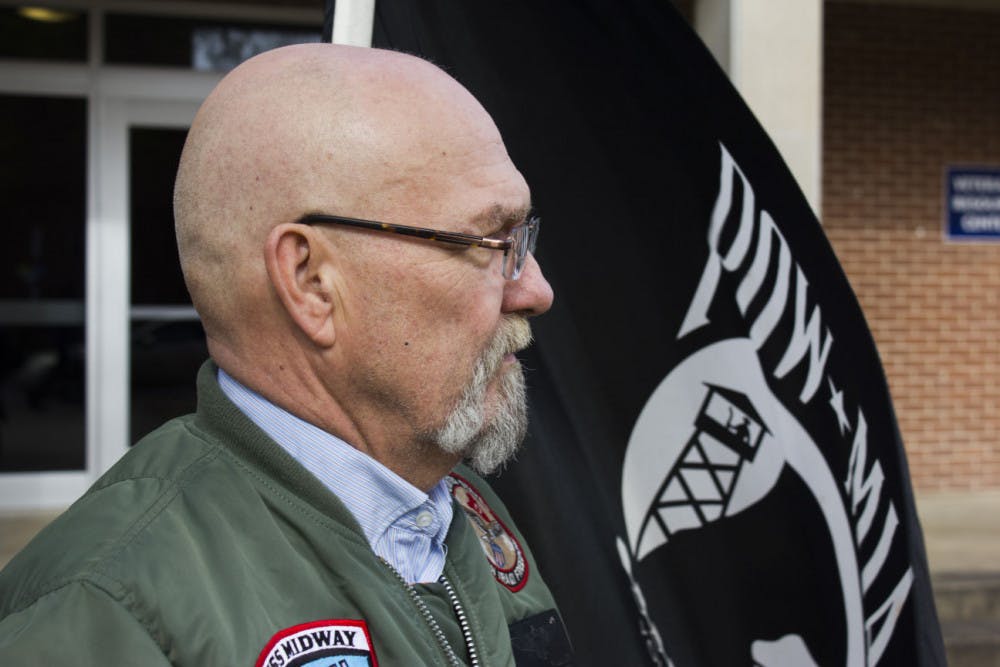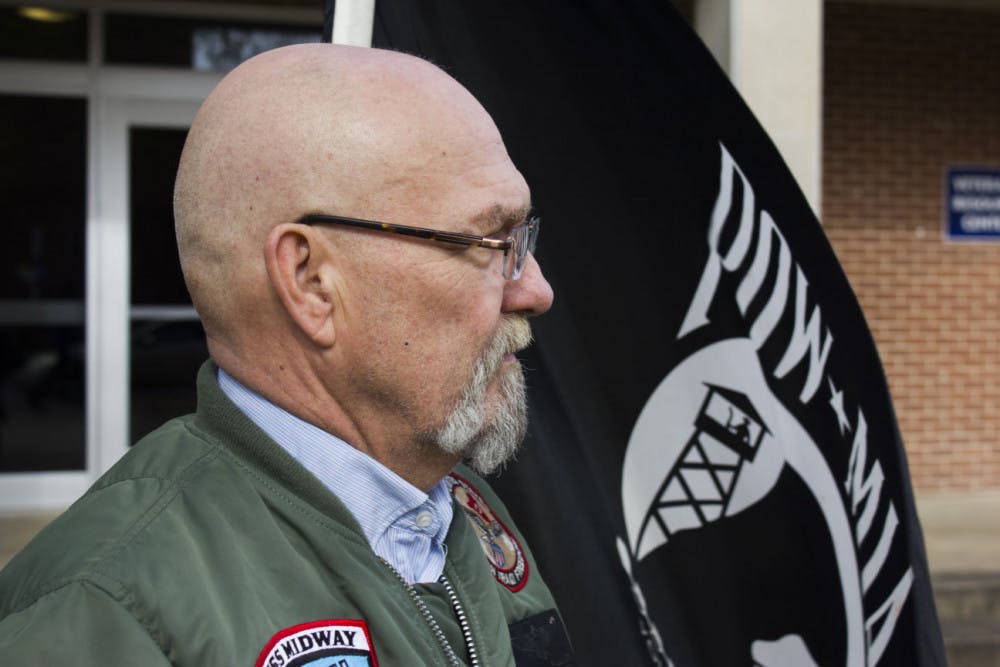
Military veteran, Michael Sasseen , has overcome many obstacles to reach his goals. However, despite these obstacles the 62-year-old hopes to complete his master's degree in May.
Michael Sasseen slides into a chair in the Pan-Hellenic building, his eyes weary but focused. It’s the early afternoon, and the graduate assistant is prepping for tutoring. In May, the 62-year old will graduate with a master’s degree in business administration and a 3.76 GPA. The completion of his college career is close, but for Sasseen, it’s only the middle of his journey.
The veteran leans from his chair, gingerly sliding up the left side of his jeans towards his knee. On his leg are 200 scars caused by cigar burns.
In 1975, a supervisor repeatedly pressed the hot tip of his cigar against Sasseen’s calf. The 19-year old had enlisted in the U.S. Navy. They sent him to the Survival, Evasion, Resistance and Escape school, a military program designed to help pilots survive being captured in war with the possibility of being tortured.
“We were doing exercises,†he said. “It just got out of hand. They burned us with cigarettes and cigars. They would bury you in sand up to neck level. It was not normal protocol.â€
But when Sasseen tried to report his supervisors, he was forced to spend two extra weeks in the threemonth program.
The veteran completed the program and went into active duty as an in-flight trouble shooter, but his experiences in the SERE program were forever engraved in his memories.
“It was degrading,†he said. “I didn’t understand what was going
on.â€
The combination of traumatic experiences in the SERE camp and 12 years in the military left Sasseen with severe Post Traumatic Stress Disorder, which the veteran struggled to cope with.
“I didn’t know how to deal with it,†he said. “So I went to work.â€
After the Navy, Sasseen returned to school, receiving a bachelors in special education in 1985, which he used to teach for the next 13 years.
On the side he began designing and building furniture. He even created a library table for the Oval Office at the request of President Ronald Reagan.
“I was keeping myself busy,†he said. “That was how I would deal with it [PTSD], I didn’t have time to think about anything but work and family.â€
Sasseen was slowly but surely recovering from his time in SERE and the military. But physical damage would soon take its toll.
“From 1999 to 2003 I had a stroke, two heart attacks, colon cancer, half of my colon removed and a torn esophagus twice,†he said.
These injures prevented him from teaching and making furniture. The physical and emotional effects took a toll on Sasseen.
“It destroyed me,†he said. “Because building my furniture and my teaching was my passion. When I lost that, I lost everything.â€
These injuries were followed by the death of his father in 2004, and Sasseen lost control.
“It [the PTSD] went full-blown,†he said. “I was having flashbacks, nightmares, anger, isolation, insomnia and avoidance. It literally put me in a wheelchair.â€
But Sasseen turned a corner.
He was accepted into the National Center for PTSD in Menlo Park, California, which would forever change his life. In therapy he was grouped with ten younger veterans, and witnessed them cry over each others stories.
“It really resonated with me,†he said. “So I made a commitment to God that I would go back to school, study psychology, get a master’s in business administration and start a homeless veteran’s facility and crisis center.â€
Sasseen published a PTSD self-help book in 2008, and in 2010, enrolled in the University of Memphis. There he found an instant rapport with his professors and advisor.
“He’s the type of advisee who enriches an advisor’s life,†said Mary Brignole, his advisor through University College.
But after four semesters Sasseen hit another roadblock, with his kidneys shutting down due to lithium prescribed by the Veterans hospital.
“I almost died,†he said. “But I had a commitment to God that I couldn’t
fail.â€
Sasseen made an inconceivable recovery and returned to his degree, graduating summa cum laude and receiving the dean’s award for special achievement. Now, he’s only four months from completing his master’s degree. But his job is far from done.
After graduation, he’ll begin raising money for his homeless veteran’s facility, with a $1.5 million dollar goal. It’s a daunting task, but after everything Sasseen’s been through, he’s not too concerned.
“I’ve got a commitment to God,†he said. “And I can’t fail.â€






